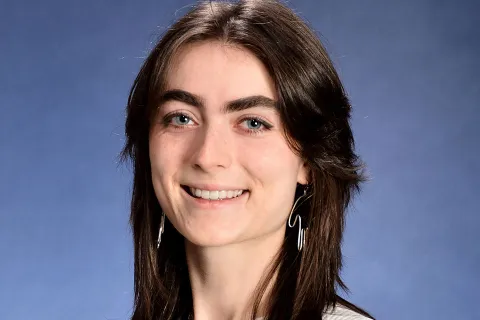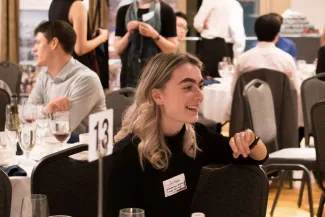"Call your friends when you cannot solve a problem. Message someone when you are blanking on a design. Ask for help. Ask for guidance. Success is support and learning from one another."

Lucy Myrol
- Degree:
- Bachelor of Applied Science
- Grad year: 2022
- Program:
- Campus: Vancouver
I am a recent UBC Geological Engineering graduate. During my degree, I focused on geohazards and environmental geology. When I am not busy studying landslides, you can find me route-setting at UBC’s climbing gym. Following my graduation this spring, I hope to continue my work with geohazards and climate change mitigation projects to create safer and more resilient communities.
Why did you choose to go into your field of study at UBC?
It is no secret that the world we live in is becoming increasingly vulnerable to climate change. The ever-present BC wildfires and the atmospheric river last fall are stark reminders of this. My interest in climate change and fascination with natural disasters led me to pursue a bachelor’s degree in Geological Engineering, focusing on environmental geology and geohazards. The projects, research, and job opportunities in Geological Engineering presented a tangible way to build a career helping others and mitigating the impacts of climate change.
On the other hand, I felt drawn towards Geological Engineering because of the tightly knit community and the supportive environment that the program facilitates. The people I have worked with, including professors and graduate students, are friendly, eager to help, and have continued to be an unending source of support throughout my degree.
What has made your time at UBC memorable?
One of my favourite aspects of attending UBC was my time at the Aviary, a volunteer-operated climbing gym on UBC campus. I have been an active Route-Setter, Monitor, and Instructor with this club since 2018, and I am the current Head Route-Setter. My passion for the Aviary stems from my love of rock climbing and a deeply rooted desire to make climbing accessible to more diverse communities. As an organization, the Aviary focuses heavily on student inclusion and removing systemic barriers to outdoor sports: a vision I agree with wholeheartedly.
Tell us about your experience in your program. What have you learned that is most valuable?
Near the start of my degree, I volunteered at the Canmore Geoscience Centre. While this experience was brief, I see it as the beginning of a passion for science communication and the spark that led me to throw myself into heavier and more demanding leadership roles. During my time at UBC, I was involved with the Aviary, took on several key leadership roles with the Geological Engineering Undergraduate Club (GeoRox), and worked as a Teaching Assistant for Geomorphology. I particularly enjoyed teaching, and I found orchestrating lab sessions, engaging with students, and working with the teaching team to transition back to in-person classes was a fresh and rewarding challenge. Through experiences like this, I learned that the most important aspect of risk management is communication. In this respect, the time I have spent volunteering, learning how to manage a team, and acting in student leadership has been invaluable to me.
In addition, the science communication work I have done fuels my love for art and design. A good infographic gives me an outlet to incorporate creative elements in a field where there is otherwise very little room for artistic expression.

What advice would you give a student entering your degree program?
Do not underestimate your support system. The people I met in Geological Engineering came to be friends and now colleagues whose opinions and advice I value highly. When you are struggling, talk to upper-year students, graduate students, and your professors. The benefit of being in a small program is the safety net of the support system, take advantage of it.
How did your studies in the Faculty of Applied Science prepare you for the future of work?
Almost all major infrastructure and energy generation projects have some aspect of Geological Engineering; the fact that built systems interact with the earth is universal. Because of this, Geological Engineers work on a highly versatile set of projects such as building skyscrapers, designing water resource infrastructure, improving dam safety, digging tunnels, and facilitating sustainable mining practices. The soul of the program is about real-world problem solving, and it is a very down-to-earth program, pun intentional. In addition, Geological Engineering is one of the oldest programs at UBC; we recently had our 100th anniversary. While I cannot predict the future of work, I am confident that the versatile nature of the program contributes to its timelessness.




